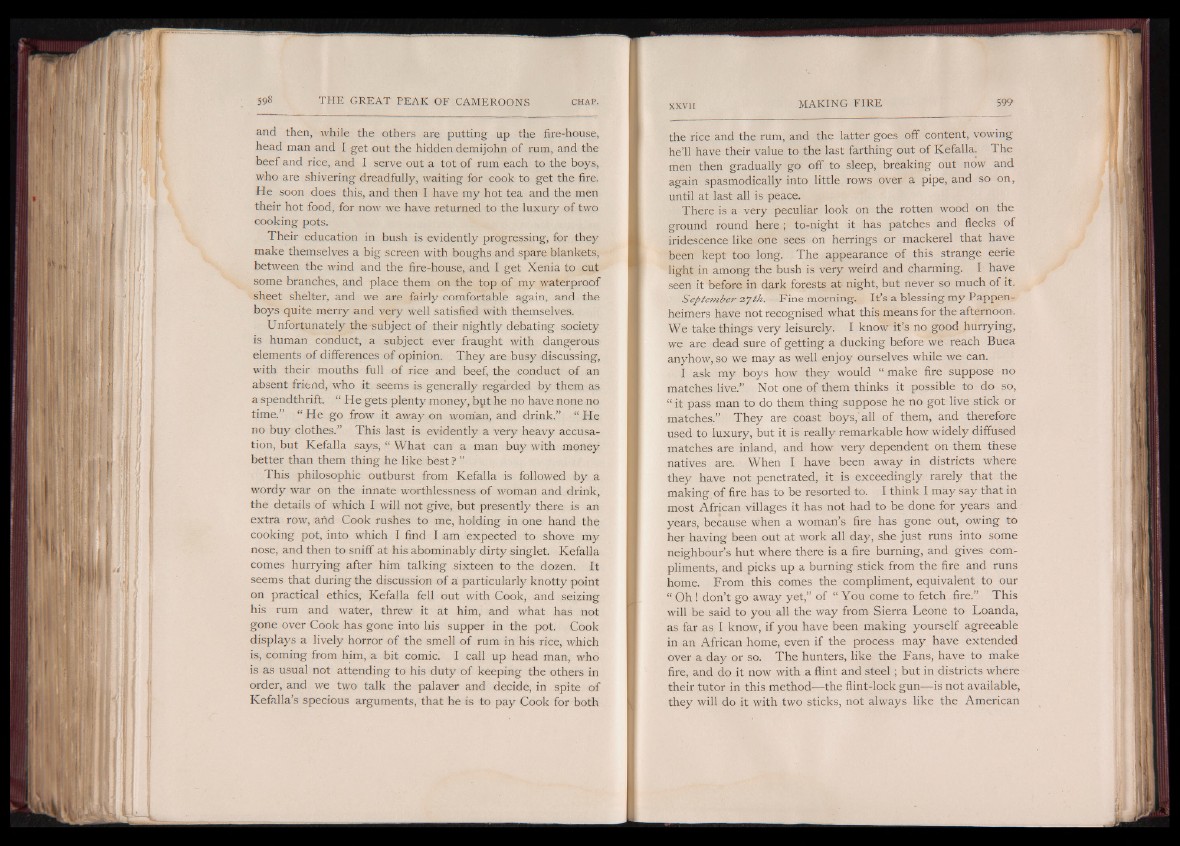
and then, while the others are putting up the fire-house,
head man and I get out the hidden demijohn of rum, and the
beef and rice, and I serve out a tot of rum each to the boys,
who are shivering dreadfully, waiting for cook to get the fire.
He soon does this, and then I have my hot tea and the men
their hot food, for now we have returned to the luxury of two
cooking pots.
Their education in bush is evidently progressing, for they
make themselves a big screen with boughs and spare blankets,
between the wind and the fire-house, and I get Xenia to cut
some branches, and place them on the top of my waterproof
sheet shelter, and we are fairly comfortable again, and ■ the
boys quite merry and very well satisfied with themselves.
Unfortunately the subject of their nightly debating society
is human conduct, a subject ever fraught with dangerous
elements of differences of opinion. They are busy discussing,
with their mouths full of rice and beef, the conduct of an
absent friend, who it seems is generally regarded by them as
a spendthrift. “ He gets plenty money, byt he no have none no
time.” “ He go frow it away on woman, and drink.” § He
no buy clothes.” This last is evidently a very heavy accusation,
but Kefalla says, “ What can a man buy with money
better than them thing he like best ? ”
This philosophic outburst from Kefalla is followed by a
wordy war on the innate worthlessness of woman and drink,
the details of which I will not give, but presently there is an
extra row, and Cook rushes to me, holding in one hand the
cooking pot, into which I find I am expected to shove my
nose, and then to sniff at his abominably dirty singlet. Kefalla
comes hurrying after him talking sixteen to the dozen. It
seems that during the discussion of a particularly knotty point
on practical ethics, Kefalla fell out with Cook, and seizing
his rum and water, threw it at him, and what has not
gone over Cook has gone into his supper in the pot. Cook
displays a lively horror of the smell of rum in his rice, which
is, coming from him, a bit comic. I call up head man, who
is as usual not attending to his duty of keeping the others in
order, and we two talk the palaver and decide, in spite of
Kefalla’s specious arguments, that he is to pay Cook for both
the rice and the rum, and the latter goes off content, vowing
he’ll have their value to the last farthing out of Kefalla. The
men then gradually go off to sleep, breaking out now and
again spasmodically into little rows over a pipe, and so on,
until at last all is peace.
There is a very peculiar look on the rotten wood on the
ground round here ; to-night it has patches and flecks of
iridescence like one sees on herrings or mackerel that have
been kept too long. The appearance of this strange eerie
light in among the bush is very weird and charming. I have
seen it before in dark forests at night, but never so much of it.
September zythMS'me morning. It’s a blessing my Pappen-
heimers have not recognised what this means for the afternoon.
We take things very leisurely. I know it’s no good hurrying,
we are dead sure of getting a ducking before we reach Buea
anyhow, so we may as well enjoy ourselves while we can.
i ask my boys how they would “ make fire suppose no
matches live.” Not one of them thinks it possible to do so,
“ it pass man to do them thing suppose he no got live stick or
matches.” They are coast boys,'all of them, and therefore
used to luxury, but it is really remarkable how widely diffused
matches are inland, and how very dependent on them these
natives are. When I have been away in districts where
they have not penetrated, it is exceedingly rarely that the
making, of fire has to be resorted to. I think I may say that in
most African villages it has not had to be done for years and
years, because when a woman’s fire has gone out, owing to
her having been out at work all day, she just runs into some
neighbour’s hut where there is a fire burning, and gives compliments,
and picks up a burning stick from the fire and runs
home. From this comes the compliment, equivalent to our
“ Oh ! don’t go away yet,” of “ You come to fetch fire.” This
will be said to you all the way from Sierra Leone to Loanda,
as far as I know, if you have been making yourself agreeable
in an African home, even if the process may have extended
over a day or so. The hunters, like the Fans, have to make
fire, and do it now with a flint and s te el; but in districts where
their tutor in this method— the flint-lock gun— is not available,
they will do it with two sticks, not always like the American